|
|
|
Sort Order |
|
|
|
Items / Page
|
|
|
|
|
|
|
| Srl | Item |
| 1 |
ID:
092444
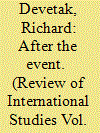

|
|
|
|
|
| Publication |
2009.
|
| Summary/Abstract |
In this article I enquire into the conceptualisation and construction of the event, a topic much neglected in International Relations, but one which has become increasingly central to recent debates in continental philosophy. I juxtapose the fictional event depicted in Don DeLillo's brilliant novel, White Noise, with the non-fictional event of September 11. I suggest that apprehending any kind of socially or politically significant event, depends on narrative. To take the argument further, I argue that narrative is a crucial device by which we moderns (and postmoderns) actually experience such events and social reality.
|
|
|
|
|
|
|
|
|
|
|
|
|
|
|
|
| 2 |
ID:
068952
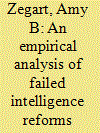

|
|
|
| 3 |
ID:
022028
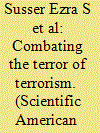

|
|
|
|
|
| Publication |
Aug 2002.
|
| Description |
70-77
|
|
|
|
|
|
|
|
|
|
|
|
|
|
|
|
| 4 |
ID:
101011
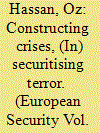

|
|
|
|
|
| Publication |
2010.
|
| Summary/Abstract |
The European Union's (EU) counter-terrorism strategy has been particularly dynamic, developing as a result of 'crises' and subsequent post-crisis narrations. The events of 11 September 2001, and the Madrid and London bombings have proved to provide moments of punctuation from which policy evolution and institutionalisation has followed. As a result of such crises, the EU has increasingly regarded terrorism as a direct challenge to the Union's role as a security actor and sought to institutionalise a diverse range of security governance technologies across its multiple pillars. Such an approach is noticeable for its qualitative difference compared to EU strategy pursued throughout the end of the twentieth century, and demonstrates an increased willingness for the EU to assert its role in the world. Yet, what is highly noticeable from the EU strategy and the proliferation of security governance technologies is the manner in which the EU has securitised 'terrorism' in the pursuit of internal, external and normative objectives. As a consequence, the EU has inflated the threat posed by terrorism, and increasingly attempted to 'Europeanise' its response. Evident in such a strategy however, is the manner in which counter-terrorism practices can generate greater insecurity inside and outside of the Union.
|
|
|
|
|
|
|
|
|
|
|
|
|
|
|
|
| 5 |
ID:
152874
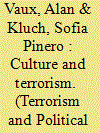

|
|
|
|
|
| Summary/Abstract |
The relationship between terrorism and culture was systematically examined using three high-quality global databases. Contrary to prior research, terrorism—collapsed across form and era—was not related to any of Hofstede's cultural dimensions. Yet, particular forms of terrorism—incidents involving substantial casualties and damage, suicide bombings, and the proportion of incidents involving fatalities—all showed relationships with cultural dimensions. Tolerance of terrorism and relative tolerance of the 9/11 attack were related to cultural dimensions and terrorist events. Finally, populations that were relatively voiceless, disengaged from their communities, suffering, angry, and hopeless showed more tolerance of terrorism and incidents of terrorism.
|
|
|
|
|
|
|
|
|
|
|
|
|
|
|
|
| 6 |
ID:
021464


|
|
|
|
|
| Publication |
Spring 2002.
|
| Description |
3-22
|
|
|
|
|
|
|
|
|
|
|
|
|
|
|
|
| 7 |
ID:
131298
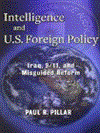

|
|
|
|
|
| Publication |
New York, Columbia University Press, 2014.
|
| Description |
xvi, 413p.Pbk
|
| Standard Number |
9780231157933
|
|
|
|
|
|
|
|
|
|
|
|
Copies: C:1/I:0,R:0,Q:0
Circulation
| Accession# | Call# | Current Location | Status | Policy | Location |
| 057760 | 327.1273/PIL 057760 | Main | On Shelf | General | |
|
|
|
|
| 8 |
ID:
023320
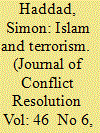

|
|
|
|
|
| Publication |
Dec 2002.
|
| Description |
812-828
|
|
|
|
|
|
|
|
|
|
|
|
|
|
|
|
| 9 |
ID:
061568


|
|
|
|
|
| Publication |
Mar 2005.
|
| Summary/Abstract |
Debates using Just War theory to evaluate the morality of military action have been common as of late due to America's involvement in Afghanistan and Iraq since 9/11. However, in debating the ethical use of force, it is often forgotten that Just War doctrines were formulated in a very different political and strategic milieu than the 21st century. Moreover, proponents of traditional Just War fail to note that many of the tenets are more pragmatic than ethical. This paper provides a reconceptualization of both the pragmatic and moral bases of Just War theory and its relation to the War on Terror. More specifically, the paper reframes jus ad bellum and jus in bello, taking into consideration rogue states, weapons of mass destruction, and non-state terrorist actors and networks. In addition, the paper discusses the application of jus post bellum criteria and proposes that Cold War containment policies provide a model for advancing an ethical and practical War on Terror.
|
|
|
|
|
|
|
|
|
|
|
|
|
|
|
|
| 10 |
ID:
139997
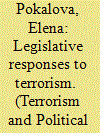

|
|
|
|
|
| Summary/Abstract |
Recent years have witnessed a significant increase in the amount of counterterrorism legislation worldwide. The commonly held assumption behind the adoption of counterterrorism legislation links it to the terrorist threat in a state. However, little research has focused on empirically testing reasons driving states to legislate. This article addresses this void by analyzing the puzzle of why states choose to adopt new terrorism-specific legislation. The article presents empirical analysis of the probability of states to legislate before and after September 11, 2001, and is based on a new database of counterterrorism legislation. The findings reveal that before September 11, state decisions to adopt new legislation correlated with the number of terrorist organizations operating in their territory. Since September 11, however, the most significant predictors for the adoption of new legislation have become the existence of previous counterterrorism legislation and the participation of a state in the War on Terror.
|
|
|
|
|
|
|
|
|
|
|
|
|
|
|
|
| 11 |
ID:
061579
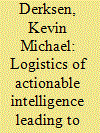

|
|
|
|
|
| Publication |
May-Jun 2005.
|
| Summary/Abstract |
The pre–11 September intelligence era challenged the security community to acquire actionable intelligence about the impending terrorist attack. But what is actionable intelligence? This article argues that it is an awareness of the target, timing, and type of attack being planned, and presents evidence that at least one of these elements was missing from the threat signals provided by the National Security Agency, Rick Rescorla, Nawaf al-Hazmi and Khalid al-Mihdhar, Zacarias Moussaoui, and Kenneth Williams. Thus, the 2001 attack could not have been prevented.
|
|
|
|
|
|
|
|
|
|
|
|
|
|
|
|
| 12 |
ID:
021474
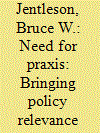

|
|
|
|
|
| Publication |
Spring 2002.
|
| Description |
169-183
|
|
|
|
|
|
|
|
|
|
|
|
|
|
|
|
| 13 |
ID:
086412
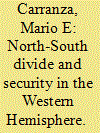

|
|
|
|
|
| Publication |
2009.
|
| Summary/Abstract |
This paper examines the economics-security nexus in US policy toward South America, and the implications for South America of the 'securitization' of US foreign economic policy during the Bush administration. There has always been a tight linkage between the US foreign economic and security agendas but the real issue is the degree of 'tightness' at a given point in time. After the Alliance for Progress lost its way the United States tended to pursue its economic and security interests in South America in separate tracks, even if preventing Soviet intrusions in the region remained in the background. Yet after the collapse of the Free Trade Area of the Americas (FTAA) negotiations in 2004 a US strategy of 'divide and conquer' through bilateral trade deals has been accompanied by a 'securitization' discourse and there are some indications that it may 'securitize' as a new threat the social movements and neopopulist regimes that oppose neoliberal economic policies. The paper discusses the limits of the securitization thesis. The conclusion examines the future of US-South American relations and argues that the United States needs to renew its commitment to genuine multilateralism and re-engage the region to establish an effective and lasting partnership for dealing with common economic and security challenges in the twenty-first century.
|
|
|
|
|
|
|
|
|
|
|
|
|
|
|
|
| 14 |
ID:
159897
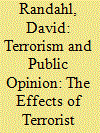

|
|
|
|
|
| Summary/Abstract |
This article uses a large-n dataset to investigate the effect of terrorist attacks with American victims on the popularity of the U.S. president. The study uses two broad theoretical frameworks to analyze this effect, the score-keeping framework and the rally-effect framework. The findings of the study show that, when excluding the effect from the September 11, 2001 terrorist attacks, actual terrorist attacks have no generalizable short-term impact on the popularity of the U.S. president. This indicates that even though the topics of national security, terrorism, and the president’s ability to handle these issues are important in the political debate in the United States, actual terrorism has little or no short-term impact on presidential approval ratings.
|
|
|
|
|
|
|
|
|
|
|
|
|
|
|
|
|
|
|
|
|